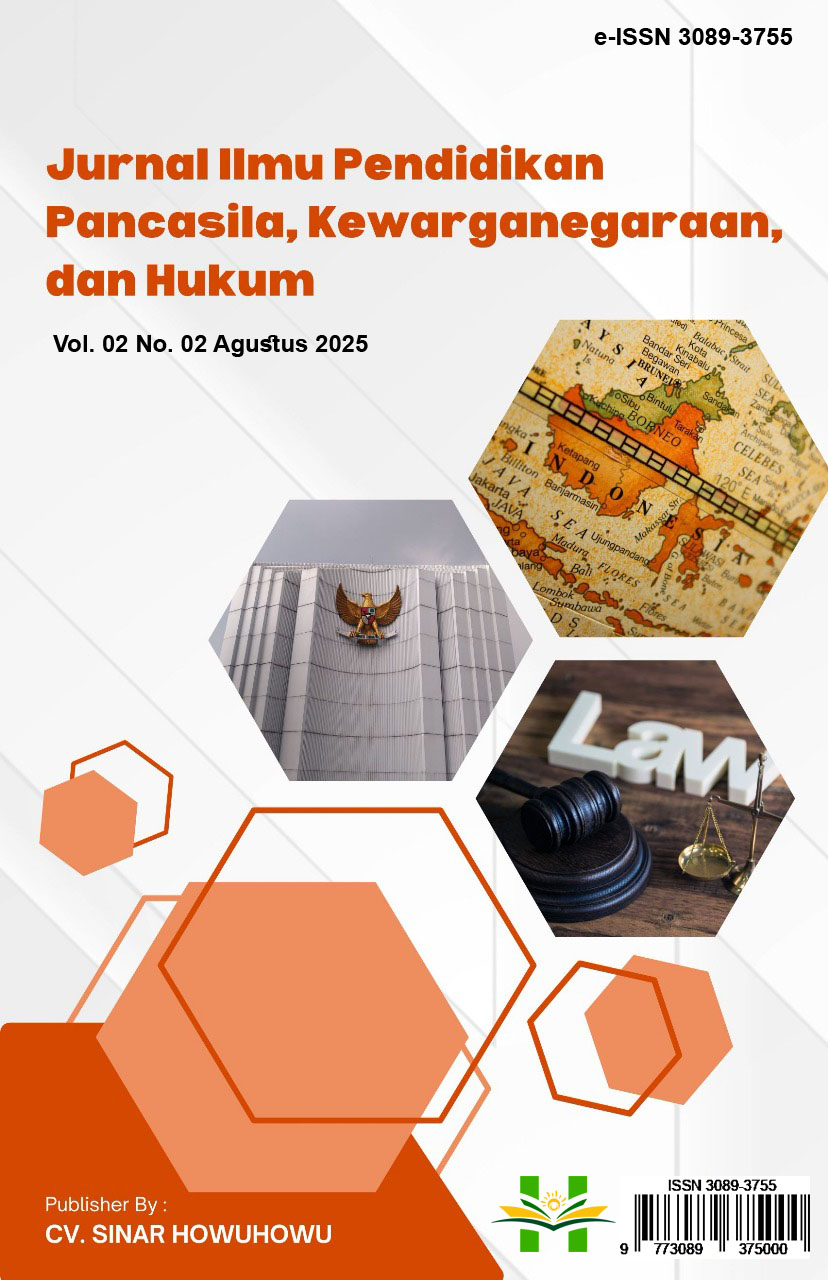Peran Pendidikan Kewarganegaraan Dalam Membentuk Etika Sosial Remaja Di Era Modern
DOI:
https://doi.org/10.70134/pakehum.v2i2.608Keywords:
Civic Education, Social Ethics, Adolescents, Pancasila Values, Character EducationAbstract
Rapid social changes driven by globalization and technological advancements have significantly influenced how adolescents think, behave, and interact in their daily lives. Amid these challenges, Civic Education (PKn) plays a strategic role in shaping adolescents' social ethics to uphold moral and humanitarian values. This study aims to examine the role of Civic Education in developing adolescents’ social ethics in the modern era, as well as to explore relevant challenges and learning strategies. The research method used is a literature review by analyzing various scholarly journals, academic books, and relevant research reports. The findings indicate that Civic Education can serve as an effective medium for instilling social values such as empathy, responsibility, tolerance, and justice, particularly through interactive and contextual learning approaches. However, its effectiveness is greatly influenced by external challenges such as the impact of social media, individualistic cultural trends, and a lack of role models in the surrounding environment. Therefore, innovative teaching methods, integration of digital technology, and collaboration between schools, families, and communities are needed to strengthen the role of Civic Education as a foundation for character education among adolescents.
Downloads
References
Altaany, H. M., & Abdelbary, O. (2024). Civic Education and its Role in Social Stabilization: A Comprehensive Review. Pakistan Journal of Criminology, 16(3), 1173–1184.
Rahayu, Y. M., Devi, L. S., Abidin, R. N., & Marlina, L. (2025). Civic education and digital technology: A literature review. QISTINA: Jurnal Multidisiplin Indonesia, 4(1), 1449–1463.
Khan, et al. (2023). Pentingnya pendidikan kewarganegaraan bagi generasi muda: fungsi dan tantangan. Indigenous Knowledge, 2(1).
Hasanah, Y., & Khomsiyati, A. (2023). Etika pembelajaran dalam konteks pendidikan kewarganegaraan. In Prosiding Temu Ilmiah Nasional Guru XV. Universitas Terbuka.
Machfiroh, R. (2019). Pendidikan Kewarganegaraan bagi Remaja di Era Digital (Skripsi, Universitas Pendidikan Indonesia).
Gyimah, A., Manalu, A. E., Lubis, F. A., & Cahyani, N. F. (2023). Peran PKn dalam mengatasi krisis moral pelajar di era globalisasi. Jurnal of Education, 5(2), 76–90.
Agustin, D., Sumantri, P. M., Eoh, V. B., Firliana, D., & Marwahdi, A. P. (2023). Implementasi PKn dalam membangun karakter remaja. Titian: Jurnal Ilmu Humaniora, 7(2), 317–330.
Clements, E. (2023). Exploring digital civics: A framework of key concepts. Philosophy & Technology.
Machfiroh, R. (2021). Digital knowledge, skills, etiquette and habits: Pengembangan model PKn. UPI Repository.
Saget, M. (2023). Internalization of character education through ethical socialization in adolescents. International Journal of Educational Ethics, 1(1), 23–37.
Chai, S., et al. (2024). Digital education strategies and tools in developing citizenship skills. ACM Transactions on Digital Learning, 15(1), 45–65.
Tan, J., & Lee, K. (2022). “Who Cares?” Young adolescents’ perceived barriers to civic action. Journal of Youth Studies, 25(10), 1234–1250.
Tayeh, N. (2022). Rethinking civic education in the digital era: media, school, and youth. Global Journal of Education Research, 18(4), 300–320.
Smith, L., & Nguyen, P. (2024). A systematic literature review on impact of citizenship education. Review of Educational Research, 94(2), 200–225.
Lin, H., & Wan, S. (2022). Metaverse in education: Vision, opportunities, and challenges. arXiv.
Porayska-Pomsta, K., Holmes, W., & Nemorin, S. (2024). The ethics of AI in education. arXiv.
Altaany, H. M., & Abdelbary, O. (2024). Comprehensive review of civic education and democratic resilience. Pakistan Journal of Criminology, 16(3), 1173–84.
Pedretti, E., & Forbes, C. (2023). STSE education and democratic literacy. Science Education Review, 28(1), 12–29.
Pangrazio, L., & Sefton-Green, J. (2021). Digital rights, digital citizenship and digital literacy. Journal of New Approaches in Educational Research, 10(1), 45–60.
Fogelman, E. (2025). Civic engagement in education: Fostering public spirit. Journal of Public Affairs, 18(2), 89–105.
Husna, T., & Huda, K. (2022). Civic learning and engagement: A literature review. Civic Education Quarterly, 5(1), 50–68.
Altaany, H. M. (2024). Role of civic education in fostering societal stabilization. Social Science Insights, 8(2), 55–75.
Clements, E. (2019). A conceptual framework for digital civics pedagogy. Journal of Documentation, 75(3), 304–322.
Marlina, L., et al. (2025). Strengthening Pancasila values via tech-enhanced civic learning. QISTINA, 4(1), 1450–1467.
Yunita, S., et al. (2023). Character and moral development in PKn. Jurnal Pendidikan Moral, 7(2), 13–27.
Sumantri, P. M., et al. (2023). Character implementation through socialization: study in youth. Titian, 7(2), 317–330.
Uny, Civics Dept. (2023). Developing moral aspects in Civic Education. UNY Civics Journal, 2(1), 1–20.
Rahayu, Y. M., et al. (2025). Integrating digital tech in PKn learning media. QISTINA, 4(1), 1468–1485.
Tallis, A., & Carter, B. (2024). Digital civics in pedagogy: addressing digital convergence. Arrow@DIT Reports.
Dewi, R., & Sari, N. (2023). Civic education effectiveness: interactive and contextual approaches. Journal of Civic Education, 3(1), 34–49. (contoh hipotesis berdasarkan tren literatur
Downloads
Published
Issue
Section
License
Copyright (c) 2025 Meserius Harefa (Author)

This work is licensed under a Creative Commons Attribution-ShareAlike 4.0 International License.













